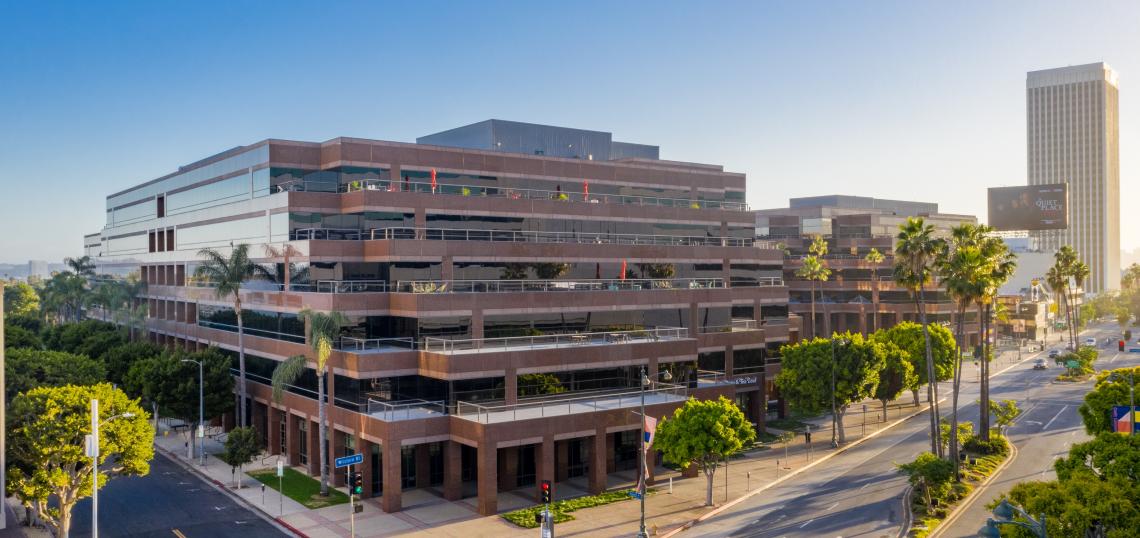Los Angeles-based CO Architects has agreed to lease 27,461 square feet of office space at the Wilshire Courtyard complex in Mid-Wilshire, Cushman & Wakefield announced earlier this week.
Onni Group, the landlord, reportedly paid $630-million to purchase the roughly 1-million-square-foot complex in early 2019. The property currently has more than 400,000 square feet of vacant space.
“The availability at Wilshire Courtyard presents a rare large-block opportunity within a strategically positioned and attractive midrise office environment. There are very few lease options of this size and quality within the Miracle Mile or any neighboring communities between Hollywood and Culver City to accommodate occupiers with large-scale requirements today," said Cushman & Wakefield managing director Josh Bernstein in a news release. “This is an ideal, versatile location for a corporate headquarters or an extension thereof, whether it be a local company or an out-of-market entrant wanting to be in the center of Los Angeles and/or near the West coastline.”
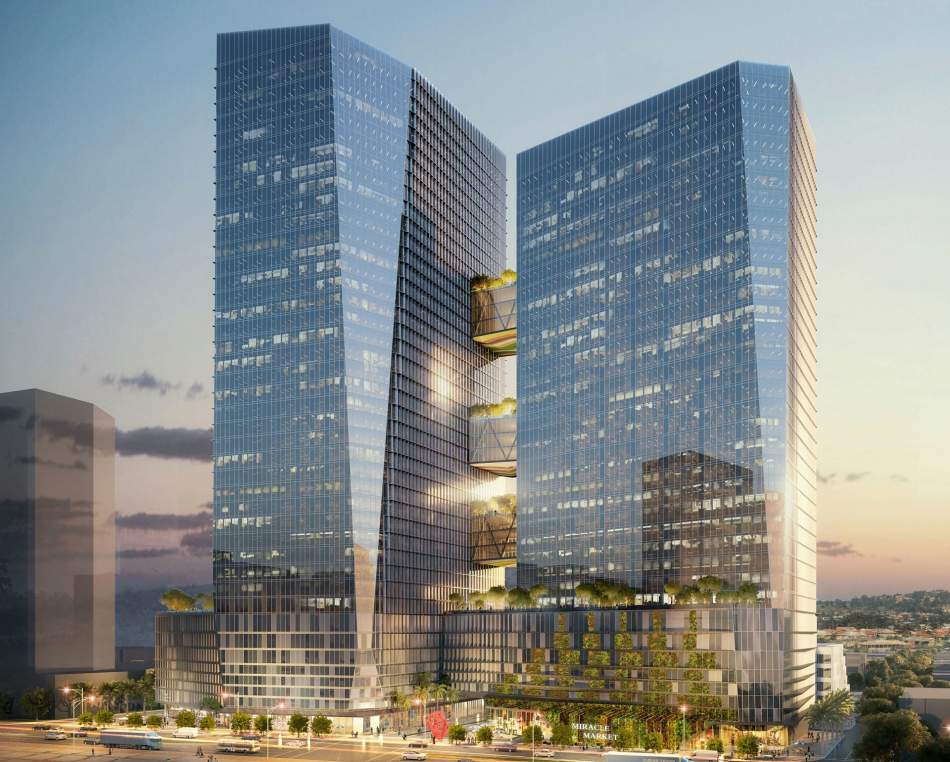 Rendering of the Wilshire Courtyard developmentSCB
Rendering of the Wilshire Courtyard developmentSCB
Despite the large blocks of empty space, Onni Group has big plans for Wilshire Courtyard. Last year, the Vancouver-based developer filed plans with the City of Los Angeles to add 1.8-million square feet of offices to the property in a pair of high-rise buildings.
Things we're reading this week:
Bird Plans to Go Public via SPAC at $2.3 Billion Valuation After a rough year that slashed $500 million off of its valuation, the Santa Monica-based company that started the e-scooter craze is poised to become a publicly traded company through a merger with Dallas-based blank check company Switchback II Corporation. (dot LA)
E-Commerce Mega-Warehouses, a Smog Source, Face New Pollution Rule "The rule, which was adopted late Friday by the South Coast Air Quality Management District’s 13-member board in a 9-4 vote, sets a precedent for regulating the exploding e-commerce industry, which has grown even more during the pandemic and has led to a spectacular increase in warehouse construction." (New York Times)
Why Los Angeles Hasn’t Solved Its Transit Crisis " On April 1, officials from the Los Angeles County Metro Transportation Authority (L.A. Metro) presented to the public controversial plans for a new Bus Rapid Transit line in Northeast L.A. connecting the San Fernando Valley to Pasadena. Then, for the next four hours, they fielded around 50 questions from more than 200 attendees, many of whom were irate at plans to convert car lanes to bus-only lanes on Colorado Boulevard in Eagle Rock, a hip suburb in the middle of the intended route." (Capital & Main)
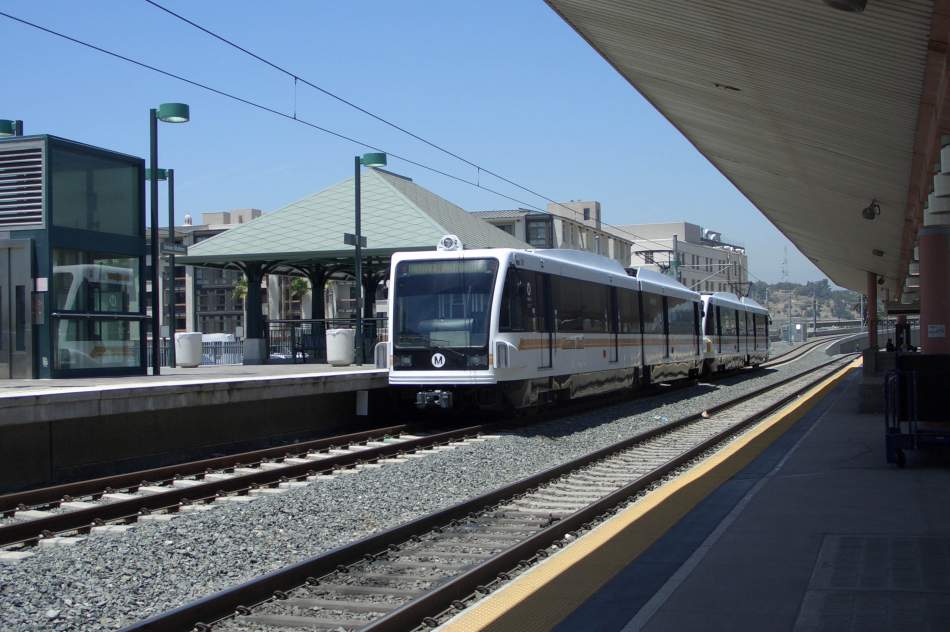 An L Line train at Union StationWikimedia Commons
An L Line train at Union StationWikimedia Commons
Design firm founder Art Gensler passes away at 85 "Architect and businessman Art Gensler, founder of what is now one of the largest design firms in the world, passed away last night at his California home. He was 85....Gensler’s namesake firm was founded in 1965 and today is an international architecture, design, and planning firm with 50 locations across the world....Gensler’s design philosophies, along with his outsized influence on the business of commercial architecture, led to the steady growth of the company, which now employs around 5,000 people worldwide." (Urbanize Austin)
2021 Update on LA Metro Projects (Part 2 of 3): The Sepulveda Line A breakdown of the big kahuna of the big ticket items on the Measure M expenditure plan. Will it be a heavy rail subway or a monorail? Metro is studyig both, but only time (and hopefully common sense) will tell. (Nick Andert Youtube)
Newsom Unveils $12 Billion Plan To Fight Homelessness, Aims To Put Thousands In Permanent Housing "The proposal includes nearly $9 billion to expand Project Homekey, which housed people experiencing homelessness in hotels and motels during the pandemic. That money would also go toward creating 46,000 new housing units and affordable apartments." (LAist)
24 fires a day: Surge in flames at L.A. homeless encampments a growing crisis "Many of the fires are limited to dumpsters and piles of trash, and the most common outcome is the destruction of tents or other shelter. A few are costly and tragic. Seven homeless people died in fires in 2020. Fires starting in camps lined beside businesses have caused tens of millions of dollars in damage, according to the Fire Department....The epidemic of fires is largely attributable to the built-in conditions for combustion in street camps — cooking stoves and campfires in close proximity to tent fabric and piles of other flammable material. But social stress is also a factor: A third of the 15,610 fires related to homelessness in the past 3 ¼ years were classified as arson." (LA Times)
Another L.A. City Bridge Project Approved Bike Lanes but Omitted Them: Riverside/Zoo Bridge "This portion of Riverside Drive is a heavily bicycled area, largely because it’s a relatively pleasant green area where multiple bikeways come together. There are two L.A. River bike paths at this bridge. On the south side of the river is the city of L.A.’s central L.A. River bike path, which currently ends at this bridge; the Riverside Drive Bridge project added a new bikeway undercrossing to extend the path to the upstream/west side of the bridge. There is another bike path nearby along the north side of the river: the city of Glendale’s Glendale Narrows Riverwalk path. In addition, Glendale has bike lanes on Riverside Drive and Sonora Avenue, both of which are within 1,000 feet of the bridge. There are also bike lanes on Zoo Drive in Griffith Park." (Streetsblog LA)
City Council Could Make LA's Al Fresco Dining Program A Permanent Thing "Launched last spring, the program allowed restaurants and bars to expand their dining areas into streets, sidewalks and parking lots so they could seat more customers while adhering to physical distancing requirements. The city also sped up the permitting process for these new outdoor dining areas and, in some cases, provided planters, barricades and umbrellas for them." (LAist)
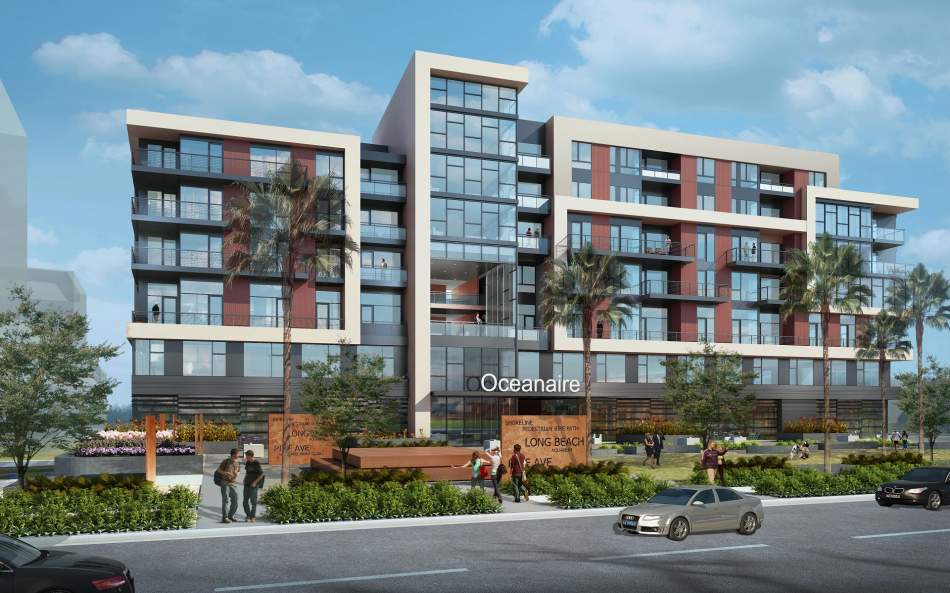 Rendering of Oceanaire - a project that was recently purchased via CSCDA’s new Workforce Housing ProgramAC Martin
Rendering of Oceanaire - a project that was recently purchased via CSCDA’s new Workforce Housing ProgramAC Martin
Filling the ‘missing middle’ in LA’s housing market is focus of new government program. Will it pay off? "Under the CSCDA’s new Workforce Housing Program, the CSCDA purchases market-rate apartment buildings using bonds that are sold to investors, who get repaid through rental income and interest. Because the buildings are government-owned, they’re exempted from property taxes. As tenants leave and leases expire, the apartments gradually turn over from market-rate to moderate-income." (KCRW)
Head of Caltrans Says Time to Pause Current 710 Freeway Expansion "We’re in a place right now where we want to put an absolute pause on this project in the format that it’s currently in. It is not aligning with the direction … that we are taking the state from a transportation standpoint. It’s plain and simple." (Streetsblog LA)
How the public can submit comments on the FY22 proposed budget "Metro’s annual budget sets transportation priorities across L.A. County for the coming year. The $8-billion budget for the 2022 fiscal year, which will be effective July 1, 2021 through June 30, 2022, will be presented to the Metro Board of Directors for approval this month." (The Source)
Everyone Agrees California’s Parking Laws Are Bad for Cities. So Why Do Planners Like Them? "If parking minimums are so bad, then why do we have them? There are two common explanations. One is that well-meaning traffic engineers believed that they could force the private sector to solve the mess of curbside parking chaos, and local politicians are now afraid of risking a dreaded “parking shortage” by letting the market decide how much parking is necessary. A more cynical take is that neighborhoods use parking as a value-neutral argument to stop new development, effectively banning low-income and infill housing without having to say so." (Slate)
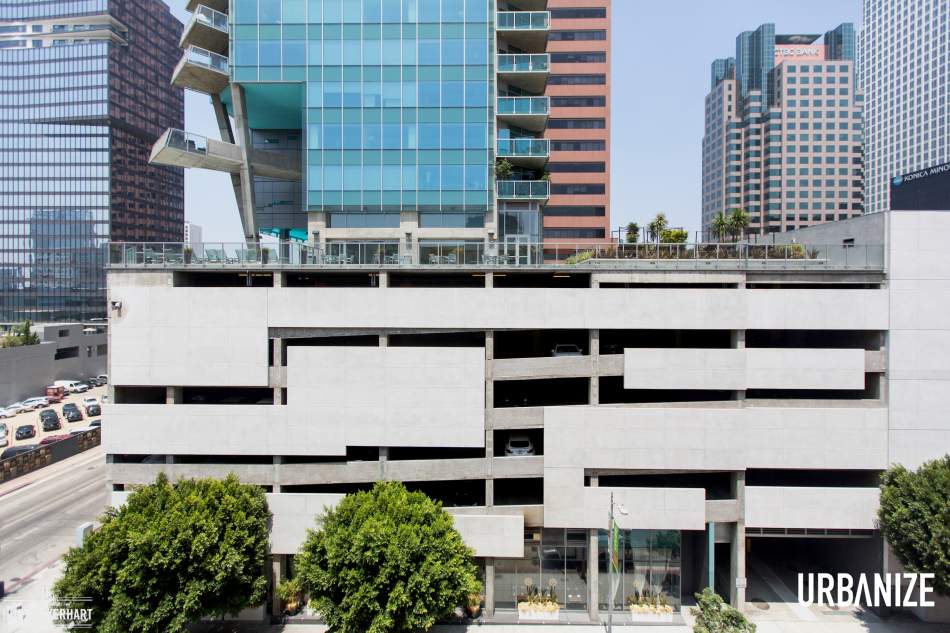 The parking podium of the Watermarke apartment tower in Downtown Los AngelesHunter Kerhart Architectural Photography
The parking podium of the Watermarke apartment tower in Downtown Los AngelesHunter Kerhart Architectural Photography
‘Microfarms’ come to South L.A. frontyards, bringing fresh produce to food deserts "Hargins and Crop Swap LA hope to grow their project and feed L.A. one yard at a time. Right now, the biggest hurdle is acquiring space, including a headquarters for Crop Swap LA — a property where Hargins and his family can live, garden, and host others who want to reproduce the model set by Asante Microfarm. Ultimately, he hopes to help build and manage 400 microfarms across the city." (LA Times)





